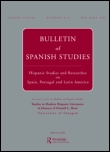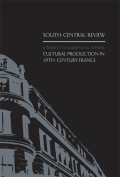
Bulletin of Spanish Studies
metrics 2024
Connecting Scholars through Spanish Literary Exploration
Introduction
Bulletin of Spanish Studies is a prominent academic journal dedicated to the exploration and discourse of Spanish studies within the diverse realms of Cultural Studies and Literature and Literary Theory. Published by Routledge Journals, Taylor & Francis Ltd, this journal serves as a crucial platform for scholars, researchers, and students to disseminate their findings and engage in scholarly debates related to Spanish literature, culture, and linguistics. With an emphasis on high-quality, peer-reviewed research, the journal holds a reputable Q3 ranking in Cultural Studies and a commendable Q2 ranking in Literature and Literary Theory, reflecting its significant impact within the academic community. The Bulletin is indexed in notable databases, achieving a rank of #314 out of 1106 in Literature and Literary Theory and #738 out of 1304 in Cultural Studies, signaling its vital role in advancing knowledge in these fields. Although it does not currently offer open access options, the journal remains an essential resource for those passionate about the study of Spanish culture and literature from 2010 to 2024 and beyond.
Metrics 2024
 0.14
0.14 0.20
0.20 0.20
0.20 8
8Metrics History
Rank 2024
Scopus
JCI (Web Of Science)
Quartile History
Similar Journals

Nueva Revista Filologia Hispanica
Illuminating the Nuances of the Spanish LanguageNueva Revista Filologia Hispánica, published by COLEGIO MEXICO, A C, DEPT PUBLICACIONES, has been a pivotal resource in the field of Hispanic philology since its establishment in 1966, transitioning to an open-access model that enhances the accessibility of scholarly works in the area. With an ISSN of 0185-0121 and an E-ISSN of 2448-6558, the journal is housed in Mexico City and aims to publish innovative research that contributes to the understanding of the linguistic and cultural dynamics of the Spanish language. It consistently ranks in the Q3 category of Linguistics and Language for 2023, reflecting its commitment to academic excellence as demonstrated by its Scopus ranking in both Arts and Humanities and Social Sciences. With converged years from 2011 to 2024, the journal encourages contributions that inspire further discourse among researchers, professionals, and students, thus solidifying its importance as a scholarly platform in the linguistics landscape.

ANALES DE LA LITERATURA ESPANOLA CONTEMPORANEA
Fostering Innovative Research in Spanish LiteratureANALES DE LA LITERATURA ESPANOLA CONTEMPORANEA is a distinguished journal published by the TEMPLE UNIVERSITY, DEPARTMENT OF SPANISH & PORTUGUESE, specializing in contemporary Spanish literature. With an ISSN of 0272-1635, this journal has carved its niche within the field, offering a platform for innovative research and discourse from 2002 to 2012 and resuming its publication from 2017 to 2024. Although it currently holds a Q4 category ranking in Literature and Literary Theory, this journal is committed to promoting high-quality scholarship, making valuable contributions to the understanding of modern literary trends and theories. Despite limited open-access options, the journal prides itself on its rigorous editorial standards and aims to engage researchers, students, and literary professionals in meaningful discussions surrounding contemporary Spanish literature. Its *Scopus ranking*, positioned at #739 out of 1106 in the Arts and Humanities category, highlights its relevance and emerging recognition within the academic community.

Criticon
Illuminating the intersections of literary and historical narratives.Criticon is a distinguished open-access journal published by PRESSES UNIV MIDI-PUM in France, dedicated to advancing scholarship in the fields of History and Literature and Literary Theory. Since its transition to open access in 2014, Criticon has fostered a vibrant academic community, enabling the dissemination of high-quality research that contributes significantly to contemporary discourse. Positioned within the Q4 categories for both History and Literature, the journal boasts impressive rankings, including #152 out of 1106 in Literature and Literary Theory, reflecting its growing influence with a remarkable 86th percentile standing. With a dedication to interdisciplinary scholarship, Criticon invites researchers, practitioners, and students to submit original articles that explore the intersections of literary and historical narratives, thereby enriching the understanding of cultural and intellectual history. Located at 5 ALLEES ANTONIO MACHADO, F-31058 TOULOUSE, FRANCE, this journal not only serves as a platform for new voices but also as a beacon for established scholarship in the humanities.

MESTER
Elevating Voices in Cultural Studies and LinguisticsMESTER is a distinguished academic journal published by the UCLA College of Humanities, known for its commitment to advancing research in the fields of Cultural Studies, Linguistics and Language, and Literature and Literary Theory. With an ISSN of 0160-2764, this journal serves as a vital platform for scholars and professionals to disseminate innovative research and critical perspectives from diverse theoretical frameworks and cultural contexts. Although currently operating without an Open Access model, MESTER continues to uphold a rigorous peer-review process, ensuring that published articles maintain high academic standards. Recognized for its selective focus, MESTER holds a Q4 categorization in Cultural Studies and Linguistics, and Q3 in Literature and Literary Theory, situating it as a relevant, if emerging, voice within these disciplines. Housed within the significant repository of knowledge at UCLA, the journal beckons researchers, students, and practitioners to engage with its contributions to the humanities and build upon its foundations in cultural discourse.

Philologica Canariensia
Exploring the depths of language and literature.Philologica Canariensia is a distinguished academic journal published by the University of Las Palmas de Gran Canaria, focusing on the vibrant fields of Literature and Literary Theory as well as Linguistics and Language. With an impact factor that positions it in the Q1 and Q2 quartiles in its respective categories as of 2023, the journal has established itself as an important platform for scholarly communication and research. Since transitioning to Open Access in 2014, it has broadened its reach, allowing researchers, professionals, and students from around the globe to access high-quality publications without barriers. With a commendable presence in Scopus rankings, including a rank of #309 out of 1106 in Literature and Literary Theory, Philologica Canariensia aims to foster an interdisciplinary dialogue and advance knowledge in the humanities. The journal's commitment to publishing innovative research makes it an essential resource for anyone engaged in exploring linguistic and literary phenomena.

Dicenda-Cuadernos de Filologia Hispanica
Unveiling the Richness of Hispanic Literary HeritageDicenda-Cuadernos de Filologia Hispanica, published by UNIV COMPLUTENSE MADRID, SERVICIO PUBLICACIONES, is a distinguished academic journal in the fields of linguistics, literature, and literary theory. Since its transition to Open Access in 2017, it has facilitated unrestricted dissemination of knowledge, making it an invaluable resource for researchers, scholars, and students interested in the rich tapestry of Hispanic philology. With an impact factor reflected by its Scopus rankings—at Q3 in Linguistics and Language and Q2 in Literature and Literary Theory—Dicenda serves as a vital platform for innovative research and critical discourse. The journal actively encourages submissions that explore contemporary and historical perspectives within its scope. Located in Madrid, Spain, the journal has steadily established itself as a significant contributor to the ongoing dialogue in the humanities, fostering a deeper understanding of linguistic and literary phenomena.

RILCE-Revista de Filologia Hispanica
Illuminating the Richness of Language and LiteratureRILCE-Revista de Filologia Hispanica is a distinguished academic journal published by the Universidad de Navarra, serving as a pivotal platform for scholarship in the field of Hispanic Philology. Established in 2008 and ongoing through 2024, RILCE stands out in the academic community with a robust reputation reflected in its 2023 ranking; it holds Q2 status in Linguistics and Language and Q1 in Literature and Literary Theory. The journal is indexed in Scopus, where it ranks 165th out of 1106 in Literature and Literary Theory, showcasing its significant impact with an 84th percentile ranking. Located in Pamplona, Spain, RILCE aims to foster critical dialogues and disseminate innovative research that advances the understanding of linguistic and literary studies, making it an essential resource for researchers, professionals, and students alike. Although specific open access options may be limited, RILCE remains committed to enriching the academic dialogue within its disciplines.

South Central Review
Illuminating Innovations in Cultural DiscourseSouth Central Review, a distinguished academic journal published by Johns Hopkins University Press, serves as a vital platform for scholarly discourse in the fields of cultural studies, literature and literary theory, philosophy, and the visual and performing arts. With an ISSN of 0743-6831 and an E-ISSN of 1549-3377, this journal is dedicated to highlighting innovative research and critical analyses that explore the complexities of Southern culture and its broader implications. Although it operates without an open access option, the journal is recognized for its rigorous peer-review process and contributions to contemporary academic dialogue, holding Q3 and Q4 rankings across several disciplines as of 2023. The convergence of ideas and perspectives from diverse academic backgrounds positions the South Central Review as an essential resource for researchers, professionals, and students seeking to deepen their understanding of the cultural narratives shaping our world today.

ESTUDIOS FILOLOGICOS
Championing Rigorous Research in Philological StudiesESTUDIOS FILOLOGICOS is a prestigious journal specialized in the fields of Linguistics and Literature, published by UNIV AUSTRAL CHILE. With an ISSN of 0071-1713 and an E-ISSN of 0717-6171, this journal serves as a vital platform for scholars, researchers, and students to disseminate their findings and foster academic discourse in philology and its related disciplines. Renowned for its rigorous peer-review process, ESTUDIOS FILOLOGICOS holds an impressive position with a Q2 ranking in Linguistics and Language and a Q1 ranking in Literature and Literary Theory as of 2023. Situated in Valdivia, Chile, and spanning from 2007 to 2023, this journal not only contributes significantly to the academic community but also engages with diverse voices in the humanities. By maintaining a balanced focus on high-quality research and accessible discourse, ESTUDIOS FILOLOGICOS continues to play an essential role in promoting scholarly information and engagement within the fields of language and literature.

BOLETIN DE LA REAL ACADEMIA ESPANOLA
Exploring Language Through Scholarly ExcellenceBOLETIN DE LA REAL ACADEMIA ESPANOLA, published by the Real Academia Española, serves as a central conduit for scholarly discourse in the fields of Linguistics and Language. With an ISSN of 0210-4822 and an E-ISSN of 2445-0898, this esteemed journal has been disseminating impactful research since its inception in 2003. As a recognized Q2 journal in Linguistics and Language for 2023, it ranks in the 45th percentile in Arts and Humanities and 42nd percentile in Social Sciences according to Scopus metrics, reflecting its solid position in academic circles. Although not an open-access journal, it remains a crucial resource for those engaged in the vibrant study of language, providing insights that inform both theoretical frameworks and practical applications. Researchers, professionals, and students alike will find prominent studies and discussions that contribute to the evolution of linguistic scholarship. The journal is published in Madrid, Spain—an environment rich in linguistic heritage that further enhances its significance in the global academic community.